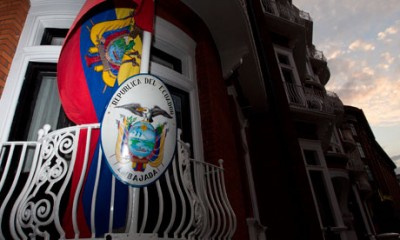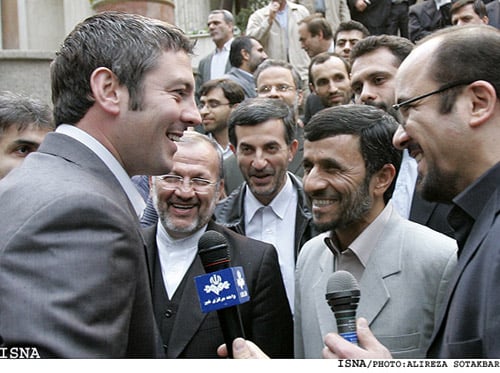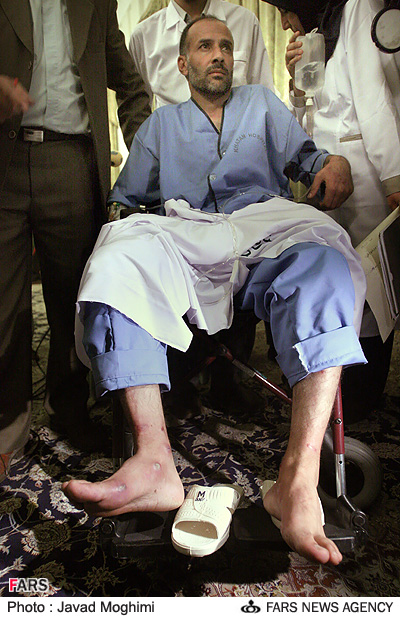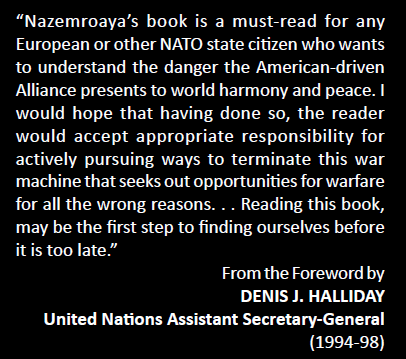The British Siege of the Ecuadorian Embassy: Déjà Vu: Anglo-American disregard for International Law

When Iranian student activists occupied the US Embassy in Tehran in 1979 as a result of the Iranian Revolution, the US and Britain condemned the Iranian provisional government of Prime Minister Bazargan even though it was not responsible. The US, UK, and their allies ranted and raved about the sanctity of foreign diplomatic missions, calling the activists “terrorists” and “anarchists.” Today, however, they endorse the storming of embassies and consulates themselves. It is also important to note that Anglo-American disregard for diplomatic sanctity is conducted at the official level while the taking of the US Embassy in Tehran was not an official act executed or sanctioned by the Iranian government.
In regard to British threats to storm the Ecuadorian Embassy to the United Kingdom in London, the focus should not be on Julian Assange, the controversial founder of WikiLeaks. The real focus of the British government’s threats should be on something much bigger and more important than one man. The real issue at hand is the total disregard for international law that has clearly emerged in the world after the collapse of the Soviet Union at the end of the Cold War.
The United States and Soviet Union never violated the diplomatic sanctity and extraterritoriality of one another’s diplomatic missions by storming them with their state security forces, even during the tensest periods of the Cold War. Embassies were consistently and securely used to relocate spies, defectors, and dissidents around the world. Many ruthless regimes and dictators during the Cold War even observed the international laws that protected the diplomatic sanctity of the diplomatic missions of other countries, even if their own dissidents sought refuge in the embassies and consulates of other countries.
The world is divided into two: those that are part of a system of empire and those that are not. The warning that British Prime Minister David Cameron’s coalition government of Conservatives and Liberal Democrats has issued to the government of Ecuador that it will assault Quito’s diplomatic mission in London if Assange is not turned over to the British government is in total disregard for international law and signifies a feeling of impunity felt within the system of empire that includes the UK. Cameron’s government is making threats to ignore and breach international law at the behest of Washington, DC. The Ecuadorian government, with the support of all Latin America, has responded by telling Britain that it is not a “British colony.” Quito should have re-worded its comments and said it is not an “American colony or dependency like the UK.”
International Law, Diplomatic Immunity Mean Nothing to the US Empire
It should be clear to all by now that international law is only selectively applied and that double-standards are in exercise. There are two standards in the world too. One set of standards is for those that have to follow the law and the other is for those that are above the law. Some countries see international laws as tools to be manipulated in their favour and cited only when it suits them. The governments of these countries pick and choose when to follow international law and when to apply it. These countries include the United Kingdom, France, Israel, and, first and foremost, the United States of America. These nations act as if it is acceptable and natural for them to have weapons of mass destruction (WMDs), illegally invade other countries, commit crimes against international peace, kill foreign nationals with impunity, and interfere in the affairs of other countries.
Diplomatic immunity and international law means nothing to the individual’s controlling the American Empire. When Chinese dissident Chen Guangcheng sought political asylum in the US Embassy to China, the Chinese government did not threaten to violate Washington’s diplomatic immunity. The behaviour of the Chinese government has been in stark contrast to that of the British government’s threats to storm the Ecuadorian Embassy in London.
London’s Threats are a Repeat of Washington’s Actions: A Look Back at 2007
No one should be surprised about the US role in the threats to violate the diplomatic immunity of the Ecuadorian Embassy to the United Kingdom. The UK is merely following in the footsteps of the US in violating the extraterritoriality of diplomatic missions. In fact, the US raided an Iranian Consulate in Iraq on January 11, 2007.
The Iranian diplomatic mission that the US stormed was in Arbil (Hewler), the capital of the Kurdistan Regional Government (KRG), and had been representing Tehran’s interests in Iraqi Kurdistan since 1992. US forces arrested and detain five Iranian diplomats without charges and ransacked the Iranian mission taking all the Iranian diplomatic files they could get their hands on, including the office computers. Aside from the Iranians, KRG officials have also acknowledged that US forces stole the mission’s files. The US government claimed it was acting on behalf of Iraq, but both the Iraqi federal government and KRG rejected this outright.
Despite their diplomatic immunity, the Iranian diplomats from Arbil would be illegally held until July 9, 2009. To justify its breach of international law, the US would claim that the Iranian diplomatic mission was only a liaison office that was in the process of becoming recognized as a diplomatic consulate. Both Iran and Iraq rejected this. In reality, the Iranian mission in Arbil had not only been operational since the Gulf War ended, but had been given recognition by the new political establishment in Iraq after the ouster of President Saddam Hussein and the Baathist government in Baghdad.
More Anglo-American Double-Standards and Breaches of International Law in 2007
On March 23, in the same year that the US military stormed the Iranian consulate in Iraqi Kurdistan, members of the British military ventured into Iranian territorial waters and were subsequently arrested by the Iranian military for trespassing. Instead of quietly obtaining their freedom, the British government politicized the issue and openly mislead the British public into thinking that the Britons were kidnapped by Iran and had never entered Iranian territory. What happened to the Iranians was illegal, but what happened to the British military personnel was legal under international law.
The treatment of the British “detainees” and “kidnapped” Iranian diplomats was not the same either. While Tehran did use the opportunity to taunt the British government, it eventually freed the captured Britons as an “Easter gift” and sign of Iranian good will. The British press seemed to have a memory lapse that the Britons were prisoners when it saw that the British military personnel showed no signs of duress or stress and that they were well treated by the Iranians (see Annex). Instead the British press began to focus on Iranian political opportunism and began to mock the badly fitted grey civilian dress suits that the Iranians had given the British prisoners as gifts.
Parallel to the arrest of the British military personnel, the Iranian diplomat Jalal Sharafi was kidnapped in Baghdad by a US-controlled group of Iraqi commandos who handed him over to the CIA on January 6, just a few days before the US raid on the Iranian consulate in Iraqi Kurdistan. Both the raid on the Iranian mission in Arbil and Sharafi’s kidnapping in Baghdad are not isolated incidents; the US government had initiated a campaign to blame Iran and Syria for Anglo-American failures in Iraq when the events happened. As a diplomat, Sharafi was illegally captured. Moreover, the Iranian diplomat was intensely tortured by the CIA through such acts as the piercing of his feet with electric drills (see Annex). In contrast the British detainees were given proper quarters and treated as guests in Tehran. The International Committee of the Red Cross (ICRC) also acknowledged that Sharafi, who would be freed on April 3, was badly tortured. Two different standards were clearly applied.
America Trying to Impose it Domestic Laws on the Rest of the World
Utter disrespect for any equally applied international standards or law is at play. We see that it is not countries like China and Iran that breach international law regularly, but countries like the US and UK. The matter also goes further, because the United States tries to impose its laws on the rest of the world.
Both the governments of the People’s Republic of China and the Russian Federation, amongst others, have condemned the government of the United States for trying to repeatedly impose its domestic laws on the rest of the world. US domestic laws that are imposed internationally are what the enforcement of the US sanction regimes against countries like Iran and Cuba are in essence. The US is even trying to impose the verdicts and rulings of its domestic courts on the rest of the world.
No country has the right to impose its domestic laws on other countries. This is a flagrant violation of the sovereignty of other countries. It an act of arrogance that implies that the rest of the world is part of a single country’s realm. In short this is how an empire acts. This behaviour, however, is also a sign of desperation as the American Empire tries exerting itself with greater force to hide the fact that it is crumbling.
ANNEX: Photographs of the British Military Prisoners of Iran and the Kidnapped Iranian Diplomat





Mahdi Darius Nazemroayais an award-winning author, sociologist, and geopolitical analyst. He is the author of The Globalization of NATO (Clarity Press) and a forthcoming book The War on Libya and the Re-Colonization of Africa. He has also contributed to several other books ranging from cultural critique to international relations. He is a Research Associate at the Centre for Research on Globalization (CRG), a contributor at the Strategic Culture Foundation (SCF) in Moscow, and a member of the Scientific Committee of Geopolitica in Italy. He has also addressed the Middle East and international relations issues on several news networks including Al Jazeera, teleSUR, and Russia Today. His writings have been translated into more than twenty languages. In 2011 he was awarded the First National Prize of the Mexican Press Club for his work in international journalism.
The Globalization of NATO (Clarity Press) by Mahdi Darius Nazemroaya.
Foreword by Denis J. Halliday.
![]()


